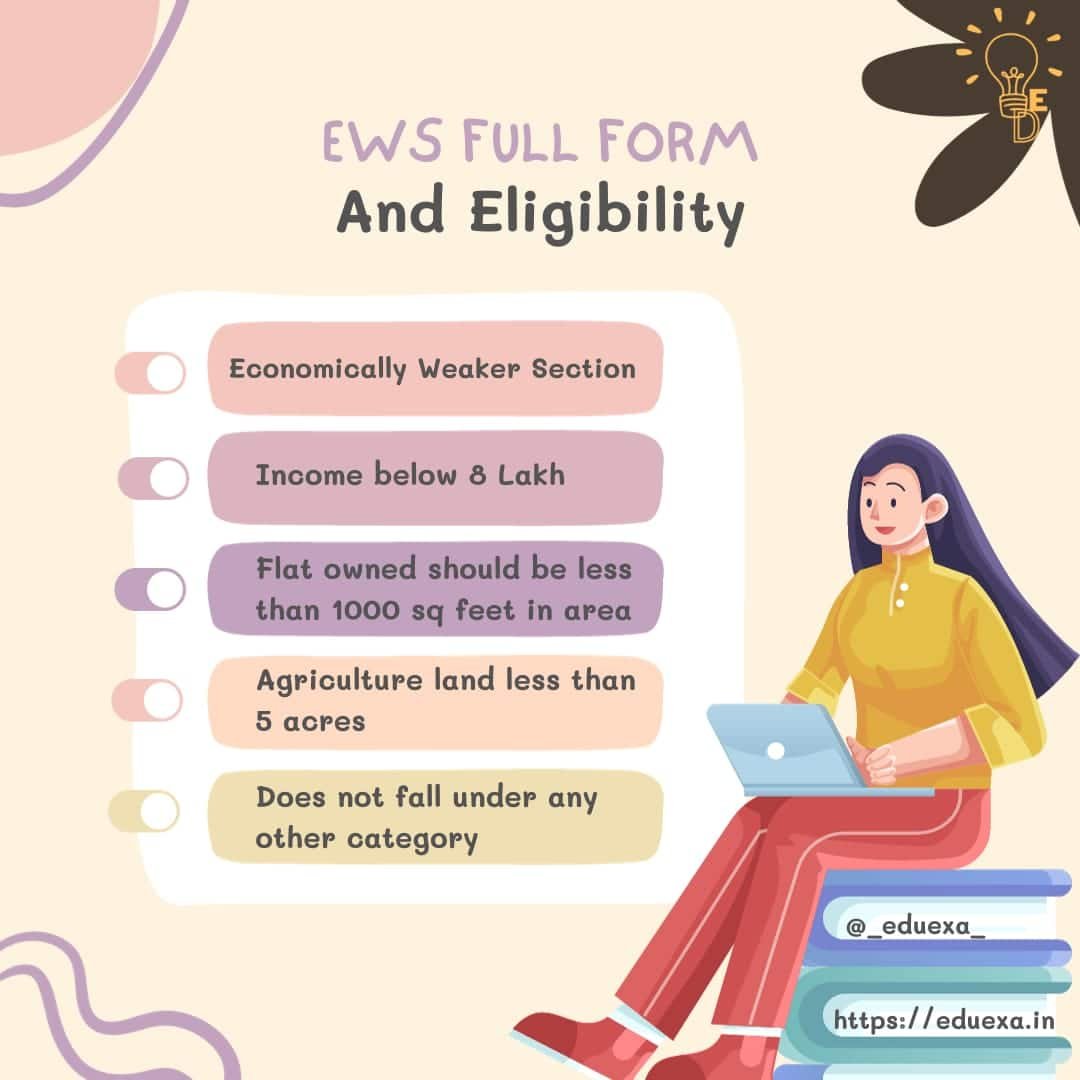EWS full form | Economically Weaker Section
What is EWS full form?
The EWS full form is Economically Weaker Sections. It is a section of Indian society that belongs to the unreserved category and has an annual household income of less than 8 lakh rupees. And has an annual household income of less than 8 lakh rupees. This category covers people who do not fall within the caste categories of ST, SC, or OBC but who have already benefited from the provisions of reservation.
EWS full form in hindi is “आर्थिक रूप से कमजोर वर्ग”
EWS category is different from ur category.
The government of India introduced a 10 percent reservation for this category of people who are not included in the ST/SC/OBC categories, but who are members of the unreserved category and meet the criteria for being from an economically weaker section of the population.
The general category candidates who are eligible for the economically weaker section reservation come from the general category and can now benefit from a 10 percent reservation if they meet the requirements to be classified as such.

Latest News Updates (2025)
Supreme Court Review on EWS Quota (May 2025): The Supreme Court is hearing petitions challenging the 10% EWS reservation in education and jobs, focusing on the ₹8 lakh annual income cap and its overlap with OBC creamy layer guidelines. [NDTV]
Income Cap Revision Proposal (April 2025): The Ministry of Social Justice is considering revising the ₹8 lakh income threshold for EWS classification to adjust for inflation and regional disparities. [The Hindu]
NEET and JEE EWS Controversy (March 2025): Disputes continue regarding EWS certificate verifications, with delays causing admission hurdles for thousands of students. [Times of India]
EWS Quota in Private Colleges (February 2025): The University Grants Commission is pushing for implementation of EWS reservation in private colleges, despite resistance from some institutions. [Indian Express]
State-Level Discrepancies (January 2025): Reports indicate uneven implementation of EWS reservation across states, sparking demands for uniform guidelines from the Centre. [BBC]
What are the implications of the EWS quota being implemented?
- Because of their financial inability, the economically disadvantaged sections of society are currently barred from attending higher education institutions and holding public sector jobs. The 10 percent quota is therefore progressive, and it has the potential to address issues such as educational and income inequality in Indian society.
- The reservation criteria should be based on economic considerations because there are many people or classes other than the backward classes who are living in a state of hunger and extreme poverty.
- The proposed constitutional amendment would recognise the poor from the upper castes as constitutionally recognised.
- Once the quota is implemented, job applicants (particularly those applying for the UPSC) from a general category will be eligible for the same benefits as OBCs.
Blue Points (Positive Aspects)
10% Reservation: The EWS quota offers a 10% reservation in government jobs and higher education, opening up opportunities for economically disadvantaged individuals from the General Category.
Merit-based Inclusion: EWS reservation is not based on caste but purely on economic criteria, promoting merit-based inclusion.
Empowers Aspirants: Provides a platform for financially challenged students to access premier educational institutions and government jobs.
Boosts Social Equity: Balances the playing field by supporting economically weaker sections without disturbing other reservation systems.
Eligibility Criteria for EWS
The Union Council of India approved a 10 percent reservation in government jobs and educational institutions for members of the economically weaker section (EWS) of the general category in the year 2019. This reservation was determined to be in addition to and above the mandatory 50 percent reservation for the ST/SC/OBC categories, in order to ensure that the existing reservations for these categories are not adversely affected by the reservation under the economically weaker section, or EWS.
The economically weaker section (EWS) provides 10 percent reservation to those who meet the eligibility criteria. If you are an aspiring government job seeker or a student aspiring for admission in your dream institute and you happen to fall into the general category, you can benefit from this 10 percent reservation under the EWS, provided you meet the eligibility criteria, which are as follows:
- You must fall under the general category, which means you cannot be a member of the SC, ST, or OBC categories, which already have reservations, or the MBC category in Tamil Nadu, which does not have reservations.
- Your family’s annual income should be less than 8 lakh rupees per year. A household with an annual income of more than Rs. 8 lakh cannot be considered economically weak and, as a result, cannot be classified as belonging to the economically weaker section (EWS).
- In the event that your family owns agricultural land, the land should be less than 5 acres in size.
- If you or a member of your family owns a flat, it should not exceed 1000 square feet in area.
What is the definition of family according to the EWS rules?
According to the EWS Reservation rules, what constitutes a ‘Family’?
For the purposes of this reservation, the term “family” refers to the following:
- The individual who wishes to make a reservation.
- His or her biological parents.
- His or her siblings who are under the age of 18 years.
- His or her spouse and children who are younger than 18 years old.
Multiple pieces of land or property owned by the family in different locations should be combined when determining eligibility for EWS reservations under certain conditions.
Documents required for EWS
The benefit of reservation under the EWS can be obtained by submitting an Income and Asset Certificate issued by a Competent Authority to the appropriate authority.
Applicants must submit an Income and Asset Certificate from one of the following authorities in accordance with the prescribed format in order to prove their eligibility for EWS benefits.
- District Magistrate/Additional District Magistrate/ Collector/ Deputy Commissioner/Additional Deputy Commissioner/ 1st Class Stipendiary Magistrate/ Sub-Divisional Magistrate/ Taluka Magistrate / Executive Magistrate/ Extra Assistant Commissioner
- Chief Presidency Magistrate/Additional Chief Presidency Magistrate/ Presidency Magistrate
- Revenue Officer not below the rank of Tehsildar and
- Sub-Divisional Officer or the area where the candidate and/or his family normally resides.
Income and Asset Certificate
Documents required for the issuing of an Income and Asset Certificate are listed below:
- Application Form
- Ration Card/EPIC Card/Aadhaar Card
- Copy of IT Returns/Pay Slip
- PAN card
- Affidavit/Self declaration
- Photo
Difference between EWS and OBC
The OBC reservations are for the non-creamy layer section of the Other Backward Classes section. They are entitled to a 27 percent reservation on the available space. The EWS is intended for members of the ‘General’ classes (those who are not members of the OBC, SC, or ST) whose family income is less than Rs. 8 lakhs. Seats are reserved for them at a rate of 10% of the total capacity.
There will be a separate (lower) cut-off for EWS candidates, in the same way that there will be separate (lower) cut-offs for OBC, SC, and ST candidates. There is, however, no other relaxation in terms of the number of attempts or the maximum age for applying for the programme.
Another distinction between EWS and OBC reservations is that, when calculating the family income for reservations, the income of the spouse is not taken into consideration in the case of OBC candidates. In the case of EWS reservations, on the other hand, it is automatically included.
Eligibility for EWS category
- Persons who are not covered by the scheme of reservation for SCs, STs, and OBCs and whose family’s gross annual income is less than Rs 8 (Rupees eight lakh only) are to be identified as EWSs for the benefit of reservation. Additionally, income shall include all sources of income for the financial year prior to the year of application, such as salary, agriculture, business, profession, and other sources of income.
- Persons whose family owns or possesses any of the following assets, regardless of whether the family earns a living, will also be excluded from being classified as EWS:
- 5 acres of agricultural land and above;
- Residential area of 1000 sq ft. and above;
- Residential plot of 100 sq. yards and above in notified municipalities;
- Residential, plot of 200 sq. yards and above in areas other than the notified municipalities.
Brownie Points (Benefits and Advantages)
No Caste Barrier: EWS reservation is caste-neutral, allowing individuals from any community to benefit if they meet the economic criteria.
Support for Education: EWS students are eligible for scholarships, fee waivers, and other financial assistance in various states.
Policy Flexibility: Some states have relaxed documentation requirements, simplifying the process of obtaining an EWS certificate.
Wide Application: EWS benefits extend to admissions in central universities, IITs, and other premier institutions.
Challenges with EWS quota
Eligibility Criteria:
- Critics argue that the income threshold of Rs. 8 lakh is excessively high and will effectively cover nearly all of the population not already covered by reservation policies.
- According to NSSO and IT department data, at the very least 95% of Indian families will fall within this restriction.
Sole Economic Criteria:
- The Supreme Court, in the case of Indra Sawhney, held that a backward class could not be defined solely on the basis of economic criteria. As a result, the introduction of reservation based on economic criteria would be subject to judicial review.
Limit of 50% :
- The Supreme Court has set a limit of 50 percent for reservations; the current proposal will exceed this limit, and as a result, it may be legally challenged.
Enforcement:
The implementation of the legislation would also be a significant challenge, given that the states lack the financial resources to enforce even the existing and constitutionally mandated reservations.
Encourage reservations:
The intent of the constitutional framers, as originally manifested in Articles 15 and 16, was for the constitution to be reviewed after ten years. However, rather than limiting the use of positive discrimination, the government is promoting it in various ways.
Pain Points (Challenges and Issues)
Bureaucratic Hurdles: Securing an EWS certificate often involves complicated paperwork and long wait times, especially in rural areas.
Strict Income Criteria: The ₹8 lakh annual family income cap may exclude deserving candidates in high-cost urban areas.
No Age or Attempt Relaxation: Unlike other reserved categories, EWS candidates do not receive relaxation in age or exam attempts.
Implementation Gaps: Inconsistent implementation across states leads to confusion and legal challenges, affecting candidates’ chances.
Overlapping with OBC Creamy Layer: Critics argue that the EWS criteria overlap with OBC creamy layer norms, leading to debates about fairness and duplication.
Frequently Asked Questions(FAQs)
1. Is it possible for EWS to take the general seat?
Ans: Yes, EWS applicants can reserve a spot in the general category. If your score qualifies you for seats in the General category, you can confirm your seat as general.
2. Is it possible for EWS candidates to apply for all of the positions/services available in any examination/selection?
Ans: Yes, as long as they meet all of the other eligibility requirements. Reservations are not available, however, for examinations conducted for recruitment to the Defence Services, such as the National Defence and Naval Academy Examination and the Combined Defence Services Examination.
3. Is there any advantage to using EWS?
Ans: Persons belonging to the EWSs who are not covered by the scheme of reservation for SCs, STs, and OBCs will be given a 10 percent reservation in direct recruitment to civil service positions and services in the government, as well as admission to educational institutions, under the provisions of the Constitution.
4. Is the EWS certification valid throughout India?
Ans: The EWS certificate is valid for one year in most states, with some exceptions. It is possible to find out whether the validity of an EWS certificate is for one year or for six months by visiting the Department of Revenue website of your state.
5. Is there a quota for EWS students in IIT?
Ans: In higher education engineering institutes, there is a 10% reservation quota for candidates from the Economically Weaker Sections (EWS) among General Category candidates (like IITs and NITs).
6. What is EWS full form?
Ans: Full form of EWS is Economically Weaker Section.
7. EWS full form in hindi?
Ans: EWS full form in hindi is “आर्थिक रूप से कमजोर वर्ग”




Pingback: Black Sea Grain Initiative UPSC: A Complete Guide in 2024
Pingback: Dravidian style temple Architechture| Dravida Temple- Eduexa
Pingback: Modern Slavery : A Comprehensive Guide in 2024 - Eduexa
Pingback: Places in News | Places in News UPSC 2024- Eduexa
Pingback: UR full form | UR Category | Unreserved Category - Eduexa
Pingback: UR full form | UR Category : A Comprehensive Guide in 2024
Pingback: General Category Reservation: A Comprehensive Guide in 2024
Pingback: Complete Guide on SCO UPSC: Shanghai Cooperation Organisation
Pingback: UR Full Form: What is UR Category | Unreserved Category in 2025